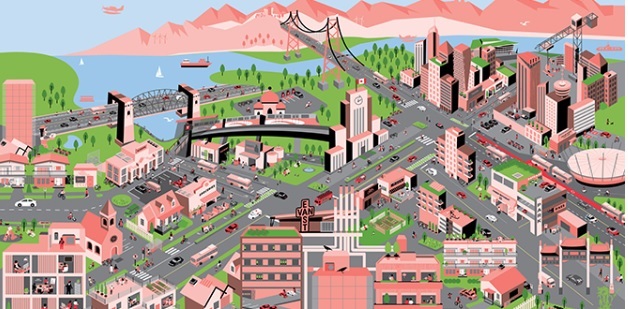
Photo: Vanvcouver-climate
Vancouver’s climate plan outlines four ‘game changer’ actions
23 November 2020
by Sarah Wray
Vancouver City Council has approved a five-year Climate Emergency Action Plan (CEAP) which charts a path to reducing carbon emissions 50 percent by 2030.
Of 19 defined actions, four ‘game changers’ have been identified to “significantly move the dial” on reducing carbon pollution from the city’s largest sources – buildings and transportation.
Designed to work in conjunction with other measures, they are:
- Create a model to implement transport pricing in the Metro Core by 2025 to reduce congestion, reallocate road space to more sustainable modes and increase walking, cycling, micromobility and transit use
- Expand residential on-street parking programmes city-wide, with a carbon surcharge on new, higher priced gas and diesel vehicles
- Set carbon pollution limits for existing buildings to transition older buildings from fossil fuels by improving energy efficiency and switching to renewable energy
- Set requirements for low carbon construction materials and practices in new buildings
Currently, 54 percent of the city’s carbon emissions come from burning natural gas used to heat space and water in buildings, and 39 percent come from burning gasoline and diesel in vehicles.
Congestion charge
Lon LaClaire, General Manager of Engineering Services, City of Vancouver, said: “With transportation as the second-biggest source of carbon pollution, we have to prioritise sustainable ways of getting around. Introducing a user-pay model for roads promotes fairness and will allow us to invest those funds in more sustainable travel options. This approach is working to move more people and reduce congestion in major cities around the world and, over the next few years, we will work with our residents and stakeholders to find the right fit to deliver similar benefits for Vancouver.”
A report to the council highlighted the use of congestion charging schemes in cities such as London, Stockholm, Gothenburg, Milan and Singapore, stating: “The realisation of robust benefits in all these locations consistently shifted initial scepticism into approval and acceptance among the greater community.”
Vancouver will also develop a city-wide transportation demand management action plan, including the promotion of remote and flexible work.
Funding
It is estimated that the city will need to invest around CAN$500 million (US$383 million) over the next five years to implement the CEAP. The funding is expected to come from the existing capital plan, new fees and charges from climate emergency actions, potential increase in investment in climate emergency actions in the next capital plan, and contributions from senior government and other partners, as well as savings from using more cost-effective approaches.
Modelling also forecasts net savings of almost CAN$1 billion for residents and businesses as a result of the changes in technology and behaviour made over the next decade. This is based on residents and businesses investing CAN$1.27 billion in solutions such as electric vehicles and heat pumps between 2021 and 2030. Those investments are forecast to generate savings of CAN$2.25 billion over their lifetime, resulting in net savings of CAN$980 million.
Consultation
Priorities in developing the CEAP included mitigating the impacts of climate change, advancing public health, making Vancouver more resilient to future disruptions and integrating equity, the city said.
Three equity reviews were completed during the process of designing the actions, and a Climate and Equity Working Group reviewed and provided input that helped refine them.
The city now plans to engage citizens further to develop more detailed action plans, which will also be brought to Council before implementation.
Gil Kelley, General Manager of Planning, Urban Design and Sustainability, City of Vancouver, said: “The Climate Emergency Action Plan is an early action in Vancouver Plan, and its approval signals a clear commitment to align Vancouver with climate science by scaling-up efforts to limit warming to 1.5°C. The actions identified are ambitious and necessary. Through them, we will improve the air we breathe, make our neighbourhoods more vibrant, reduce energy waste and switch to renewable energy sources, use low carbon construction materials in our buildings, and boost the green economy, amongst other priorities.”
“We are committed to working with residents and businesses on implementation to make sure we understand and address their needs,” he added.








